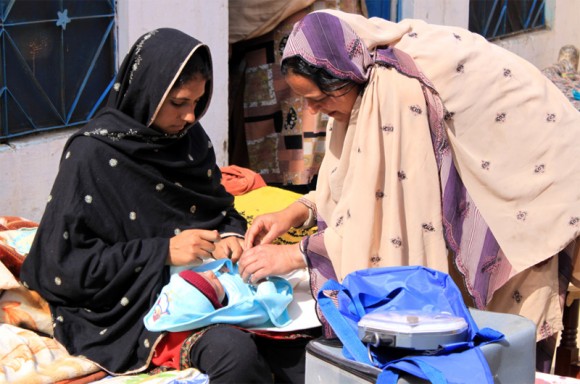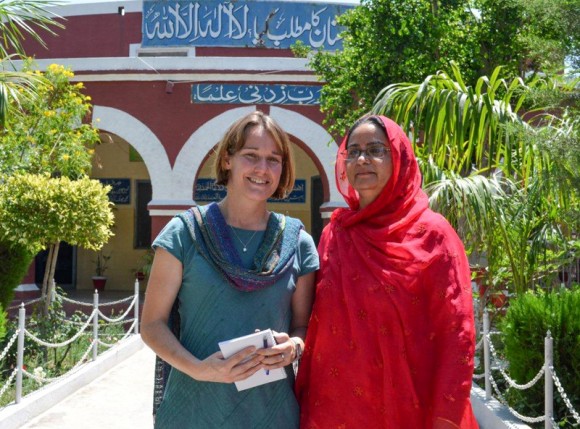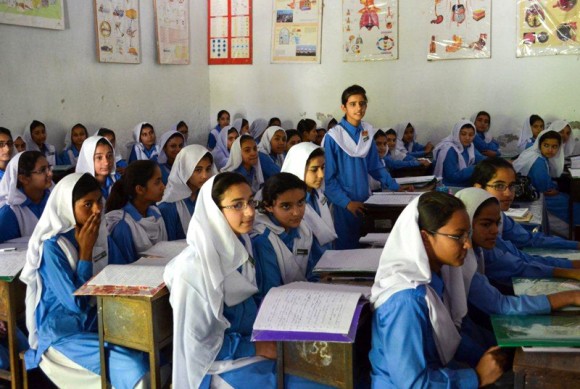In the UK, Pakistan is regularly in the news, and most of it is bad. So you may find it hard to believe that anyone would work here by choice. But I do - and I really enjoy it! Pakistan is a fascinating country with great people, stunning landscapes, and real potential for a brighter future. It's a complex environment with many deep rooted challenges, but if you think that Pakistan is all about bad news, you'd be surprised by some of what's going on here.
Let's start with the big picture - which is certainly daunting. More than 60 million people in Pakistan live on around 30p a day; nearly one in ten of the world’s out-of-school children live in Pakistan; and one in eleven children dies before their fifth birthday. The population is growing by 3 million every year and is set to rise by 50% in less than 40 years. Decades of conflict, instability, weak governance and corruption have left the state unable to deliver the services that people need.
Set against this, some things are changing - and fast. After 60 years of democratic instability, national elections this weekend will mark the first ever democratic transition from one civilian government to another. Women are gaining a voice and rights. Landmark legislation passed last year finally provides legal protection against violence, and more women will vote in this weekend’s elections than ever before – one million of them thanks to support from the UK. The media - liberalised in the mid-2000s - is flourishing, and new media and new technologies are propelling changes to banking, industry, communications, and politics which have been visible even in the two short years that I've been working here. A full 50% of Pakistanis now have access to a mobile phone. And get this - Pakistan has produced two of the world's top five most popular blackberry apps.
So the challenges are enormous, but I think there are important reasons for hope, and our support is helping to make a difference. I manage DFID's health and education work here and over the coming years we're aiming to transform education and deliver real improvements in health for poor people, especially women and girls. I'm mostly office based in Islamabad, but the best part of my job is getting out to see what's happening on the ground, where we're making progress and what still needs to be done.

For example, last Friday I went to visit some schools in central Punjab. The second one was most interesting. I walked into the headmistress' office to find her talking sixteen to the dozen to my colleague Taimoor. Without pausing for breath she recounted how hard it was trying to get her teachers to turn up every day. She would phone, cajole, scold them. She was turning down their requests for days off. But (and here she mellowed) it was working. The teachers were turning up and as a result things had improved at the school.
This was the Government Girls' Higher Secondary School in warm and dusty Jhelum. Built in 1880, it was an impressive red brick building. On the wall beside me a big banner announced the importance of the 'Punjab Schools Reform Roadmap'. This is what I went to explore - I wanted to know whether the UK's support for the Roadmap was really helping to improve things in schools.
Two years ago, Mrs Cheema's school, like most in Punjab saw around 25% of teachers fail to turn up to work on any given day. Without teachers to teach them, many of the 1700 female students would stop turning up too. Now, she told us, things were changing.

Mrs Cheema’s school is part of the turn-around happening in 60,000 schools across Punjab. Since the UK started work with the Punjab Government on the Roadmap in 2011, 81,000 more teachers have been employed in state schools. By tackling absenteeism, around 20,000 more teachers are in classrooms teaching kids each day. We’re helping to improve the quality of teaching by giving teachers lesson plans which guide them through what they need to teach, lesson by lesson. And this year, for the first time, every child in Punjab is being given a textbook for English, Maths and Urdu - a big step forward. The statistics speak for themselves, but I wanted to cross-check them against what was happening at local level.
As we walked around the school, Mrs Cheema complained that she got little recognition for all her work ensuring her teachers were in school. She, and thousands of other head-teachers across Punjab are the key to making things better. I thought she had a really good point, and vowed to raise this with the Secretary in charge of Punjab's schools when I next met him.

So some things are changing - and fast. But it's only the start. There are around 20 million kids in school in Punjab, but over 3 million don't yet go to school at primary level alone. Transforming education is the focus of my work here. DFID invests in a range of education programmes across Pakistan. As a result some 4 million children in primary school will benefit from UK aid by 2015. We are helping them learn better and for longer. There are signs that all the hard work is beginning to pay off. It's early days - to transform a system of 60,000 schools will take time - but it's starting to happen. That's why I'm here. And that's why, despite all the challenges, and despite all the bad news, I'm hopeful.
I'll put up another blog soon to keep you posted on progress, including what happens this weekend, when I'll be out and about monitoring Pakistan's historic elections.

18 comments
Comment by Muhammad Shahid Khan posted on
DFID need to focus on remote parts of Pakistan where teachers and students absenteeism and drop out is a constant problem.
Comment by Muhammad Hayat posted on
Dear
It gives me immense pleasure to visit your blog to read your comment and work experience in our homeland Pakistan. It is wonderful and great support being delivered here in Education and Health sector by DFID, besides that disaster support is also tremendous done by DFID. It indeed well recognition to services rendered by DFID staff which attained the height of success doing exceptional support to quake and flood affected population.
Our organization is also engaged to promote girls education in tribal area in Jacobabad, Sindh, Pakistan. Citizen Development Organization planned to establish girls school in tribal area mentioned above. Please help and guide us how to approach your organization for funding.
regards.
Comment by iram saba posted on
dear debbie
DFID has announce girl education fund i want to open school in my village i have land there which can i donate, can DFID will help me?
Dr. Iram
Comment by sue posted on
Dear debbie . good to read your comments and interest with pakistan .i wish to have your email ID.so i can transfer and share my idea with you regarding health and educational problums.that poor pple facing.though rich are free from any problum.kindly reply me personaly . thanks very much
Comment by Debbie posted on
Hey Muhammad Shahid,
Thanks for your comment. I agree with you. Our new programme in Punjab will include a special focus on the poorest and most remote districts. We will work with civil society organisations to get more kids, especially girls, into school there, and ensure they stay in school for longer.
We are also helping the government of Khyber Pakhtunkhwa get more children into school and we are encouraging girls to make the transition into secondary school by providing stipends.
Debbie
Comment by Debbie posted on
Dear Dr Iram, Dear Muhammad Hayat
Great to hear that you are both behind the push to get more children into school. Rather than direct aid case by case on a micro scale for each school, DFID works with governments in Punjab and Khyber Pakhtunkwa to try and get more kids into school at a large scale and to improve the quality of what those children learn. We also partner with the low cost private sector through the Punjab Education Foundation and Khyber Pakhtunkhwa's Elementary Education Foundation. Local schools can apply to join up with these organisations. The best thing to do is to get in touch with PEF and EEF direct who can offer advice and guidance on their processes. PEF can be contacted via their website - http://www.pef.edu.pk/
In addition, DFID has launched the 'Girls' Education Challenge' to help up to a million of the world's poorest girls' improve their lives through education. Check out the website for information about funding - https://www.gov.uk/girls-education-challenge
Finally, there are a number of non-government organisations doing fantastic work on education in Pakistan. The Children's Foundation, The Read Foundation, Change in Education, to name but a few! You might want to talk to them too about their work and any funding opportunities.
Comment by Zeeshan Memon posted on
Ms. Debbie
one of the most important problem facing education department today in Pakistan is the Ghost Teachers in rural area. I have very fanstastic idea about how to over come this hurdle. Because Education budget is usually need very big investments despite knowing that only solution to ghost teachers if addresssed can maximize / increase 20% to total turnout in children attendance thus can contribute to education properly. The project that DFID has started are only focused on providing qualitative joyful learning , where as these funds can be utilized properly to increase turnout of out of school children in rural area, I have a very fantastic idea about this . Have you any interest , I can discuss with you , with my idea , I highly expect that two lac students can be re-engaged in education activities. To efficiently use your funds in right direction in right way is DFID mandate. In this i can really help you because I am working in renowned organization.
Regards,
Zeeshan Memon
Manager Program Development
SAFWCO
Hyderabad Pakistan
Comment by Talha Mahmud posted on
Dear Debbie,
Good Evening!
Well DFID is really committed to enhance the level of education in Pakistan but I would like to bring your attention towards a serious concern of your partner organizations (like PEF) with their own partners (like us). We were hired to deliver the trainings and we did it but the payments are pending for months time now.
As a policy, we do not compromise on quality of the deliverables but we expect the same level of commitment from PEF. Kindly look into this matter.
Regards,
Comment by Debbie posted on
Hey Zeeshan
I agree that ghost teachers are a big concern here in Pakistan. I would to hear your idea for tackling that. Please let me know!
Debbie
Comment by raja visal posted on
you are doing great job for the people here in education and health sector. play the role to ecomonic empowerment of women '
Comment by Dr.Iram posted on
Dear Debbie
thanks for your positive response, i head of non government organization Roshni Pakistan.we have already discuss the issue with PEF , soon we will open school for Girls education in south punjab.i would like to invite you for visit here in M.ghar to see our work for women empowerment. looking forward.
Comment by raja visal posted on
education is vital for both boys and girls. the organization where I work is also a education project which is committed to accomplish the noble cause of enlightenment and promotion of literacy and education . your contribution to strengthen this village school will appreciated. you can visit our web site http://www.hafizfoundation.org for attaining information about it.
Comment by raja visal posted on
Madam Debbie!
I am very thankful to you for telling Ali Naqvi to contact with me. it'll really work in future for the sake of literacy and education promotion with logical and scientific ways.
Comment by Mrs. Narjis Ashfaq posted on
Dear Debbie,
On behalf of Sangtani Women Rural Development Organization,i would like to appreciate DFID work in Education and Health. DFID initiative for every child in School is remarkable.
please let me express our interest to work in partnership with "DFID" in throughout the Pakistan & various parts of Southern Punjab including Rajanpur, Dera Gazi khan and Muzaffargrah etc. In order to support this Request for Partnership, I am enclosing a brief profile of SWRDO projects. SWRDO would like to invite you to arrange its capacity assessment as well. We have already qualified the third party capacity assessment for WFP partnership; SWRDO capacity assessment has also done by UNHCR, Concern Worldwide /RAPID fund and many others partners as well.
Additionally, SWRDO has been partner of Gender Equality Project which was managed by British Council & DFID. With the support of GEP we completed two projects; please see enclosed GEP team remarks regarding SWRDO performance.
We are pleased to share with you that SWRDO; the premier of Women Led Civil Society Organizations in the most backward region of Southern Punjab was informally founded by a woman in Rajan Pur which extensively performed for the promotion of basic human rights particularly protection of woman rights. Formally registered in 1997 under the Voluntary Social Welfare Agencies Act 1961 with Social Welfare Dept on September 1997 and registered with Societies Registration Act, XXI of 1860 on 3rd April 2013 for National level interventions. SWRDO has emerged into a well reputed CSO which is actively engaged in the social and economic protection, rehabilitation and uplift of the marginalized communities in this region. Its key areas of intervention including food security, livelihoods, vocational training, WASH, education and disaster risk management including. SWRDO implements all its projects by adopting the strategic approaches, of protection of human rights capacity building, research, awareness raising, advocacy and service delivery. Community mobilization and grassroots institutional development is the key underlining approach of our interventions which ensures sustainability of our projects and self dependence of our communities. Furthermore it enjoys full trust and cooperation of various stakeholders which play an important role in the effective implementation of our projects.
Over the period of last 15 years of sustainable development interventions SWRDO attained a great deal of financial, technical, institutional and operational expertise sufficient enough to run a medium to large size projects with full community involvement.
As of today SWRDO has worked in partnership with wide range of donors including Concern Worldwide Pakistan RAPID fund / USAID, Emergency Response Fund ERF/ UNOCHA, UNHCR, WFP, IOM, Care International Pakistan, Punjab Education Foundation, CIDA – PAGE, GEP/DFID, Women Health Project Punjab (ADB), Muslim Charity UK and LEAD Pakistan.
SWRDO successfully completed Education project with the financial support of Punjab Education Foundation in 12 districts of Punjab.
SWRDO is member of National Humanitarian Network (NHN), Child Rights Committee (CRC), Alliance Against Hunger and Malnutrition (AAHM), National Peasant Coalition of Pakistan (NPCP) ??????? ???? ???? network in Pakistan and SWRDO is the focal point for District Rajanpur.
Having said that I would cordially invite you to kindly visit our area of interventions to examine our performance on ground for further decision making. Enlist to SWRDO in your mailing list , arrange its capacity assessment and give us opportunity to work with DIFID particularly in Education, Protection sectors including newly launched CBDRM program.
Comment by Mrs. Narjis Ashfaq posted on
Dear Greetings from Sangtani Women Rural Development Organization (SWRDO) .
We are highly interested to work with DFID under its newly launched Education project every child in School. SWRDO has strong grounds at community level and completed more than 30 projects with the support of UN agencies( UNHCR, IOM,UNOCHA /ERF), INGOs(RAPID Fund Concern worldwide,CIDA PAGE, and national organization(Punjab Education Foundation,NEF) . we are proud to share with you that SWRDO has been partner of Gender Equality Project GEP which was managed by DFID and funded by British Council. SWRDO has capacity to play vital role towards DFID newly launched Education Project in different districts of Punjab . We would be grateful if Ali Naqvi sb contact us in this regard.
SWRDO has good operational system with standard SOPs
Looking Forward
Comment by Muhammad Qasim posted on
hi
Dear Dabbie
i am working with Health Relief Development Organization. we are working in District Mansehra from last 5 years. our organization is focused on Education, mother child Health. and Democratic rights, advocacy. as our organization is new and we have limited fund for our plans activities. we would like to know that DFID are support such new born organization in Pakistan. last year we apply up to 10 Donor but every one reply that you have no experience in the relevant in the sector. organization should manage fund up to so on,XYZ. in the current situation what type of support we can aspect for DFID. so it is my humble request that please support the new born organization and encourage them.
Kind regards
Comment by shahnawaz posted on
Dear Debbie i read ur work and organization i appreciate you and your work for human. I live in village and work for poor children in education field. I teach 100 plus poor children. Many children are not come to school because they are not afford low fee. That's why i want to create a private school but i am in this condition. I request you plz kindly help me. Thanks
Comment by Raja mansoor posted on
I want to help to educate higher education and help people who are much needy people in my village in Pakistan.